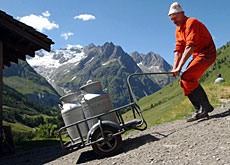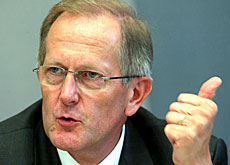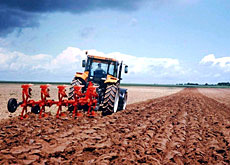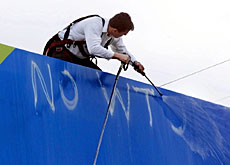Switzerland’s Cancun challenge

Expectations for this week's fifth ministerial conference of the World Trade Organization in Cancun are low.
However, the five-day meeting in the Mexican holiday resort could trigger a new impetus for trade liberalisation.
The consequences of this week’s conference will be crucial for Switzerland’s export-based economy.
Swiss diplomats must defend the country’s agricultural protectionism and the interests of its farmers, while simultaneously championing unrestricted market access in other areas.
The WTO meeting is the halfway point of the current Doha round, a series of proposed trade deals launched in 2001.
At the heart of the Doha agreement is a pledge to help boost developing economies by removing obstacles blocking their growth.
Despite the optimism of the Doha agenda, which was signed – in part – to emphasise global unity after the September 11 attacks, most of the deal’s negotiating deadlines have been missed.
The make-or-break issue facing the WTO’s 146 member states is agriculture, which has pitted the world’s richest countries against most developing nations.
The United States and the European Union are under pressure to reduce farm subsidies by the so-called “Cairns Group”, a union of 18 agricultural exporters such as Australia, Brazil, Argentina and South Africa, as well as poor countries.
Farmers in the clinch
The government says Switzerland’s farmers face potential extinction if agricultural subsidies are removed.
Luzius Wasescha, the head of Switzerland’s Cancun delegation, insists the country will be working to ensure its farmers have a future.
Switzerland has launched a proposal that would allow subsidies for what it calls “non-commercial aspects” of farming, including issues such as consumer and environmental protection.
Currently, only Bulgaria, Iceland, Liechtenstein, South Korea and Taiwan support the Swiss proposal.
Swiss farmers survive thanks to some of the world’s most generous subsidies.
On average, they derive around 60 per cent of their annual income directly from subsidies. Each Swiss cow, for instance, receives the equivalent of SFr1,815 ($1,300) in support every year.
However, the Swiss Farmers Federation says the average farming family has a monthly income of just SFr2,500 – well below the Swiss average.
Swiss delegates at Cancun are negotiating with the full knowledge that farmers have already threatened to launch a referendum against any deals that strip away their livelihood.
Negotiating straightjacket
Switzerland may have little room to manoeuvre on the issue, as it is one of several industrialised nations pushing hard for broader trade liberalisation.
Switzerland is part of a group including the EU and Japan demanding new WTO investment rules.
These include cutting barriers to competition, transparency in government procurement, and reforms to intellectual property rules.
Switzerland’s exporters, who provide most of the country’s income and jobs, strongly support these steps.
However, many developing countries say these rules would burden them without providing any commercial benefits.
Complicating Switzerland’s position is the fact that the Cairns Group, as well as the EU, has insisted on linking many of these issues to agriculture in order to win support from reluctant developing countries.
According to the Swiss Business Federation, this has put Switzerland in a negotiating straightjacket.
“We will not be able to put forward solid proposals on tariff reductions if our agricultural policies put us on the defensive,” Gregor Kündig, from the federation, recently told a Swiss financial newspaper.
Drugs
Although many experts warn that the Cancun meeting could end in a deadlock, at least one issue of direct importance to Switzerland has already been resolved.
Earlier this month, WTO members approved a deal allowing poor countries to import cheap generic copies of patented drugs for serious public health threats such as Aids and malaria.
The decision has been hailed as evidence that rich countries, especially those with big pharmaceuticals industries, are willing to make concessions to help the poor.
The deal will allow governments to break WTO rules by exporting generic drugs to countries without manufacturing capacity of their own.
In order to protect drug companies, most industrialised countries have agreed not to import generics, although some have said they will do so in emergencies.
Tariffs
Switzerland supports broader moves at Cancun to continue cutting tariffs on trade.
The OECD estimates that scrapping all trade tariffs on goods around the world would cut costs by one per cent of the value of world trade, effectively “boosting global welfare by $140 billion a year”.
Supporters of the Doha round argue that a big share of those savings would go towards boosting the GDP of the world’s poorest countries.
Cancun will also see negotiations on freeing up barriers to services in areas such as education, IT, health, finance and telecommunications.
In many economies, services industries are becoming the main source of employment, and have provided many developing countries such as India with fresh sources of income.
However, barriers to trade in services remain complex.
Unlike goods, where barriers are usually in the form of tariffs, trade in services can be hindered through restrictive labour laws, government regulation and poor infrastructure.
swissinfo, Jacob Greber in Zurich
The Geneva-based WTO formed in 1995.
It aims to expand global trade, make it more fair and competitive.
The Cancun meeting in Mexico is the half-way point of the current Doha trade round, launched in December 2001.
Doha includes proposed agreements on agriculture, intellectual property, the environment, public tendering, services, industrial products and drugs.
Doha’s central goal is to cut barriers to growth facing developing economies.

In compliance with the JTI standards
More: SWI swissinfo.ch certified by the Journalism Trust Initiative



You can find an overview of ongoing debates with our journalists here . Please join us!
If you want to start a conversation about a topic raised in this article or want to report factual errors, email us at english@swissinfo.ch.